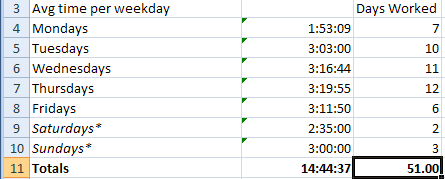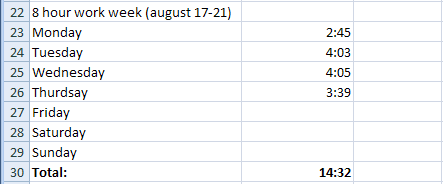One thing I’ve learned from working on games along side a day job is it takes a very strong commitment otherwise it will grind to a halt shortly after starting. You have to plan for the long haul as any game worth playing, or better yet paying for, requires much more time than you think. Especially if it’s your first ‘commercial’ endeavor. Planning is paramount if you wish to have any chance in succeeding. I have more thoughts on planning that I want to explore in future posts, but for now I just wanted to share some data for anyone else also pondering how to best fit indie game development into their already busy schedules.
The 10 hour work day
So for the past couple of months I’ve been working 10-hour days for 4 days a week at my normal day job. This means I never work Fridays. My original thinking was that having a whole day off to just work on my game would prove to be very helpful as it could be treated as a whole uninterrupted 8-hour work day. The drawback was my Monday-Thursdays were extremely busy. I knew doing this schedule would require some serious discipline to pull off and still keep physically active as to not adversely affect my health. As a result, my daily routine was rather strict and had pretty close to zero room for any hiccups or delays. Got stuck in traffic? Just lost an hour of coding. Had to run to grocery store mid-week? Just lost another hour of coding. Parents/family/friends call to chit-chat? That night of coding is probably gone. It was a constant battle to try to keep on schedule.
Ultimately, I mitigated the delays, but at the expense of sleep. What’s interesting is it wasn’t a completely conscious decision. As I kept struggling to catch up on trying to fit a few hours of coding time a night I slipped a little later into the night as the weeks went by. Eventually I was down to 5.5-6 hours of sleep a night. Some people can function with that, while others (like me) can’t sustain that sleep schedule for long. In fact, I could only last til Wednesdays on that schedule before I started noticing it was affecting me during the day.
Regardless, I pressed on for another month on this routine. It wasn’t until I started noticing I had stopped losing weight and was actually beginning to pack on weight that I decided I needed to reevaluate my plan. I have a daily routine of jogging and working out after work and it’s something I try very hard to maintain so that the long hours I put in sitting at a desk at work and at home working on my games doesn’t ruin my health. This wasn’t the only red flag that told me to reevaluate though. There were others:
- Even with Friday off I still couldn’t achieve the ‘8 hours’ of indie work on Fridays. With Monday-Thursday being so busy I had to put off an errands, shopping, routine weekly tasks to Friday if the services weren’t available on the weekends. This typically ate up half of my day.
- To further hurt my productivity on Fridays, I was so tired by that time that I typically could only muster anywhere from 2-4 hours of actual work on Fridays. This wasn’t much more than my typical nights on Monday-Thursday.
- With no wiggle room during the week my relationships with family/friends were extremely hard to maintain. Any time spent keeping in touch was directly any time I had ‘lost’ for the day to work on my game. Having general ‘social’ time throughout the week is important. But you knew that already :).
Ok, so those were all reasons for leaving a 10 hour schedule behind. But what do my timelogs say?
8-hour vs 10-hour. Fight!

The above is just a small summary of timelog data I’ve kept track in Excel over the last 3 months working 10-hour work days for the most part. It’s far from perfect, but it serves its purpose. The interesting number there is ‘Totals’. At 14 hours and 44 minutes I was working a rather crazy schedule. And as mentioned earlier, my Fridays ended up being no different than any other day of the week. My Mondays interestingly had a consistently lower time (case of the Mondays perphaps?).
Data is wonderful. It allows you to make predictions based off realistic performances. I had this fantasy of working ‘8 hours’ on Fridays, and it ultimately proved to be fictitious. So was my original thinking that 8-hour work days wouldn’t allow me a large enough chunk of hours during the week to get anything worthwhile done? After some number crunching I found two very compelling facts:
- Working 8-hours a day Mon-Friday at a day job and working on the game just Monday through Thursday would give me AT LEAST the same amount of hours I would get working 10’s, and in the best case scenario I could gain 3-4 more hours a week.
- I would be able to get 7-8 hours of sleep a night consistently.
Any experiment was in order. So I decided to work 8 hour days the last week and the results are in:

Hah, Success! So after coming home from “work” two hours earlier I was able to work on my game for only 4 of the days of the week and STILL get about the same amount of hours in with the 10-hour/day schedule. And you know what the best part is?
- I could have some semblance of a life now. I could hang out with friends, talk to family, any time inside the week and not fear that I was losing time
- I could get some decent amount of sleep
- Overall quality of life was higher
The End Is Nigh
Looking back on the data and my memories of the past couple of months, it seems obvious that an 8-hour work schedule for my day job would’ve been the better bet. But I seem to have been caught up on the idea of having a whole day to my game seeming like a great way to make progress on it in large chunks. In reality, I couldn’t ignore the other things that needed to be done that week and Friday became ‘catch up on errands’ day rather than ‘Tilt To Live Development’ day. Now, the 10-hour work week I still believe is completely workable if you wanted to work into the weekend and simply did not work on anything after work during the week. This approach is good I think for the ‘weekend warrior’, but I tend to want to reserve my weekends for relaxing, hanging with friends, and playing games :).
So anyone who is in my position of deciding what type of work schedule to run at their day job while trying to finish their own indie game hopefully will find some of this data useful. I know some companies offer 9-hour work schedules with either half-day Fridays or every other Friday off, but I think I would still decide to go with the 8s. I’ve found that spreading the hours across the week helps me keep up a higher level of productivity and motivation than trying to cram it into the end of the week or weekend. You have to treat the development of your game like a jog, not a sprint. My major flaw was thinking that working for long concentrated hours (ie on Fridays) was better than short sustained sessions across the week. When it comes to coding it’s hard to start and stop constantly, but it’s something I have to get use to. I’ve noticed as time goes on I’ve become better at breaking up seemingly monolithic tasks into workable chunks.
In the end, the most important thing to find is balance. I believe I may have found mine for the time being…
